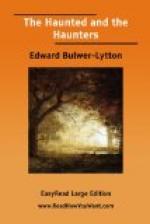On the third day after the occurrence of the events related at the outset of our narrative, a letter, which had come, in the first instance, to a gentleman in the neighbourhood, and who also had a son in the 42nd, was put into M’Pherson’s hands, by a servant of the former.
The man looked feelingly grave as he delivered it, and hurried away before it was opened. The letter was sealed with black wax. Poor M’Pherson’s hand trembled as he opened it. It was from the captain of the company to which his sons belonged, informing him that both had fallen in the attack on Ticonderago. There was an attempt in the letter to soothe the unfortunate father’s feelings, and to reconcile him to the loss of his gallant boys, in a lengthened detail of their heroic conduct during the sanguinary struggle. “Nobly,” said the writer, “did your two brave sons maintain the honour of their country in the bloody strife. Both Hugh and Alister fell—their broadswords in their hands—on the very ramparts of Ticonderago, whither they had fought their way with a dauntlessness of heart, and a strength of arm, that might have excited the envy and admiration of the son of Fingal.”
In this account of the noble conduct of his sons the broken-hearted father did find some consolation. “Thank God!” he exclaimed, though in a tremulous voice, “my brave boys have done their duty, and died as became their name, with their swords in their hands, and their enemies in their front.” But there was one circumstance mentioned in the letter, that affected the poor father more than all the rest—this was the intimation, that the writer had, in his hands, a sum of money and a gold brooch, which his son Alister had bequeathed, the first to his father, the latter to his mother, as a token of remembrance. “These,” he said, “had been deposited with him by the young man previous to the engagement, under a presentiment that he should fall.”
When he had finished the perusal of the letter, M’Pherson sought his wife, whom he found weeping bitterly, for she had already learned the fate of her sons. On entering the apartment where she was, he flung his arms around her, in an agony of grief, and, choking with emotion, exclaimed, that two more of his fair lights had been extinguished by the hand of heaven. “One yet remains,” he said, “but that, too, must soon pass away from before mine eyes. His doom is sealed; but God’s will be done.”
“What mean ye, John?” said his sobbing wife, struck with the prophetic tone of his speech—“is the measure of our sorrows not yet filled? Are we to lose him, too, who is now our only stay, my fair-haired Ian. Why this foreboding of more evil—and whence have you it, John?” she said, now looking her husband steadfastly in the face; and with an expression of alarm that indicated that entire belief in supernatural intelligence regarding coming events, then so general in the Highlands.
Urged by his wife, who implored him to tell her whence he had the tidings of her Ian’s approaching fate, M’Pherson related to her the circumstance of the mysterious lights.




